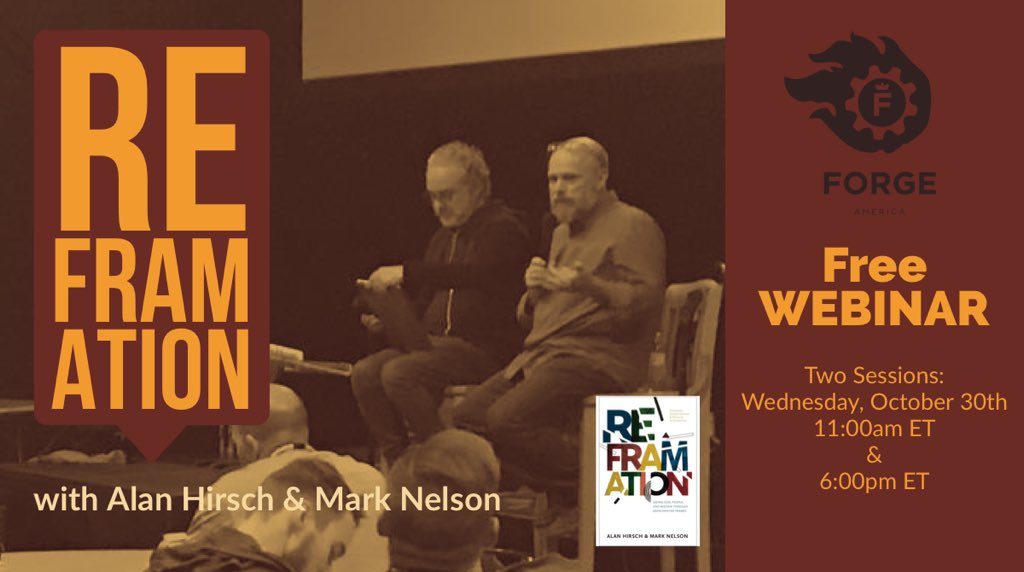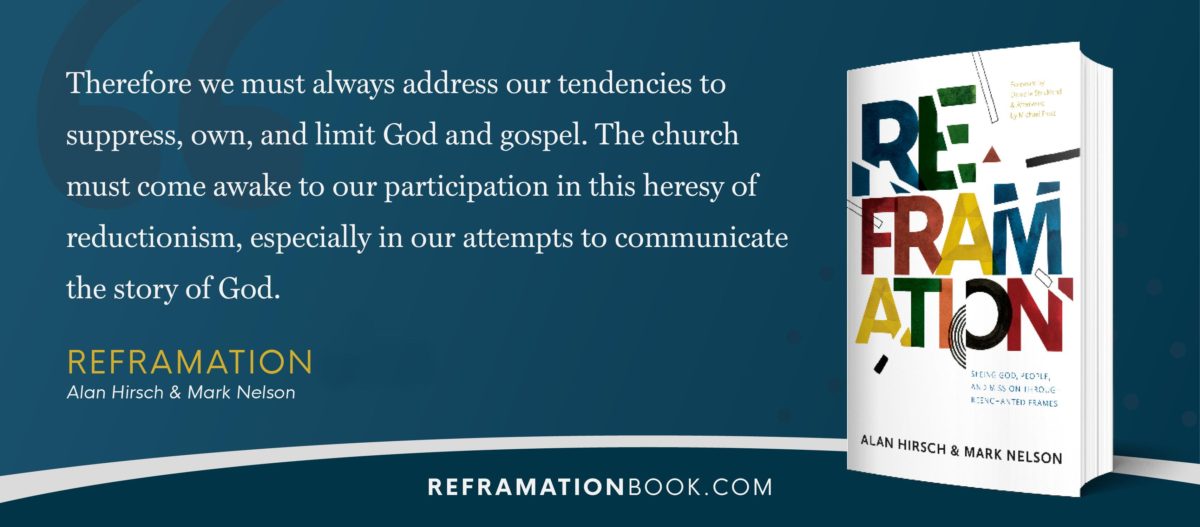Today, we have an exclusive look at Reframation: Seeing God, People and Mission Through Re-enchanted Frames, the new book by Alan Hirsch and Mark Nelson. This work…whoa!
This new book takes a fresh, careful, studied and inspired at the Gospel. In the reading that follows, straight from Chapter One: Moving The Moon, you are going to find a word about reduction: the art of reducing the gospel to a concept so much smaller than it was intended. Reading Reframation is like watching a seed grow into the oak that was always inside of it. Enjoy the excerpt
THE GREAT REDUCTION
Alongside the eclipsing of God, there has been a corresponding loss of the whole due to a focusing on the parts. In other words, we have lost a sense of the big story that makes sense of all our little stories. It is this loss of wholeness that contributes to the eclipse, concealing and alienating us from the truth of the one God—and it is this loss of the whole that lies at the core of heresy.
In its original meaning, the word heresy does not infer that someone is wrong or has believed a falsehood. Rather, it simply refers to a particular truth or belief that has been extracted from its true and complete context and is subsequently treated as if it were the whole truth. This explains why every heretic in the history of the church has had a verse or two of Scripture they rigidly hold to.
Or, as N. T. Wright notes: The greatest heresies do not come about by straightforward denial […] They happen when an element which may even be important, but isn’t central, looms so large that people can’t help talking about it, fixating on it, debating different views of it as though this were the only thing that mattered.
The point is that the so-called “heretic” really has (re)discovered some truth that has been lost, ignored, or suppressed. That is something to get excited about. However, the error in the heresy is in the exaggerated enthusiasm or preoccupation that ensues. The heretic becomes increasingly obsessive and sectarian by making the newly recovered particular truth into the whole truth. Its real meaning is obscured because it is separated from the greater Truth from which it has been extracted. Truth thereby becomes fragmented.
The poet Rumi lamented this shattering of truth:
The Truth was a mirror in the hands of God.
It fell, and broke into pieces.
Everybody took a piece of it and they
looked at it and thought they had the truth.
Heresy is not exclusive to theology and religion. If we look into just about every other domain of knowledge, we can see that this sort of reductionism affects everything. For instance, it happens when ideas—be they theological, political or sociological—are reduced and distilled into a singular controlling “ideology” through which the insiders interpret their world and organize their purposes in order to act on it.
In the fields of science and philosophy, heresy occurs when knowledge becomes over-specialized and fractured, leading to various specialties warring with one another about who is really correct. Bemoaning this very fact, the philosopher E. F. Schumacher quotes the renowned psychiatrist Viktor Frankl as saying that:
The present danger does not really lie in the loss of universality on the part of the scientist, but rather in his pretense and claim of totality […] What we have to deplore therefore is not so much the fact that scientists are specializing, but rather the fact that specialists are generalizing. The true nihilism of today is reductionism […] Contemporary nihilism no longer brandishes the word nothingness; today nihilism is camouflaged as nothing-but-ness.
Reductionism can very definitely lead to a preoccupation with one thing— the monomaniac or fanatic is the result. The fanatic is a person with little empathy, humility, or humanity. Consider the suicide bombers of our day as the exemplary fanatics. Such people are “radicalized” by over-focusing on a reductionist Jihadist ideology by which all else is subsequently measured. They become radical sectarians, losing all meaningful relationship and perspective. And in case we are tempted to assume that ideological fanaticism is limited to those “Muslim crazies,” consider the current state of “uncivil war” in the United States. The “either/or” ideology of the monomaniacal conservative or the arrogance of the elitist liberal becomes prohibitive to even “seeing” the truth in/of the other, let alone finding the ability to engage them as fellow humans. Refining that thinking down further to Christian circles:
If you consider most conservative evangelicals, they do not believe that God is a lively character and a real agent, because they’ve got God all packaged up into sustained systematic explanations. And if you consider most theological progressives, they don’t believe that God is a real character and a lively agent either, because they really believe that God has no hands but our hands.
We are so easily imprisoned by our own interpretations and so convinced of the absolute rightness of them that we close the door to engaging the ever-greater God. This was precisely the problem with Israel’s leaders in the time of Jesus. Their interpretations became the theological prisons for their own souls and minds as well as for the collective mind of Israel. In Jesus’ words, they had access to the keys to the kingdom but ignored them, and hindered others from entering the kingdom as well (Matthew 23:13; Luke 11:52). When this reductionism occurs today, the story we tell manifests itself as propaganda rather than theology.
Please do not misunderstand us here—the fact is, because truth is so big and complex, analytical reductions are necessary if we are going to successfully negotiate the world (or communicate the gospel for that matter). However, because they are only fragments extracted from the whole, they should never be mistaken for the whole picture, in all its unfathomable mystery. We ought never to lose sight of the enormity of truth itself—especially when we are talking about God and the mystery of his involvement in our world.
You can get your copy, wherever you buy books, like…Amazon. Check out the website, reframationbook.com – and – sign up for the free webinar @ reframation.eventbrite.com


